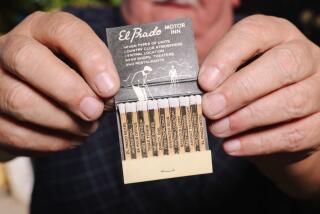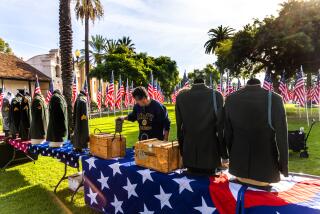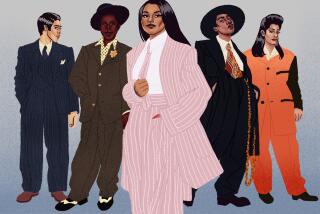Collector of Uniforms Gleans Insight Into Tapestry of the Past
Jeffrey A. Sharp’s monthly military uniform swap meet at the Sequoia Athletic Club in Buena Park is more of a history lesson to him than a moneymaking venture.
In fact, “The show consistently has lost money and each year I have to scale it down,” said Sharp, 25, who said he owns about 450 uniforms, most of them hanging in rented storage bins.
“But I have a lot of fun, and each time I hold a show, I learn something more about the uniforms and how they figured in history,” said the self-employed Anaheim gardener, who specializes in maintaining athletic facilities.
“One of these days I’m gonna meet one of the people who wore one of these uniforms and find out what his life was like in the war.”
Sharp is also learning that the youth of today are not all that interested in uniforms, even if they belonged to their fathers or grandfathers.
“We get a lot of ex-military guys at the swap meet who want to sell their old uniforms because they want to get it into the hands of someone who would appreciate them,” said Sharp, who served six years in the Navy Reserve. “They tell me their sons (couldn’t) care less about the uniforms.”
And Sharp feels that’s tragic.
“Things like the war and the holocaust which comes from the war should not be forgotten,” he said. “The day you forget it is the day it will begin again.”
Sharp said an estimated 6 million World War II servicemen will soon be retiring from their civilian jobs. “And they want to make sure someone has a positive feeling for their uniforms because their own sons don’t.”
He is often called by teachers to give talks to high school students about the history behind his collection of uniforms, medals, patches, campaign ribbons and military hats. He has a British military feather hat that is 125 years old.
“I don’t give talks to elementary school kids because I don’t think they can understand the Holocaust and that’s part of what I spell out,” he said.
“I don’t know whether the feeling about the Vietnam War had anything to do with the lack of interest in the uniforms by young people.”
But he knows about the uniforms and their history, including those from other countries such as his collection of British uniforms from the Victorian Era, but he said German uniforms provoke some concern.
“Whenever an article is written about uniforms that include those worn by the Germans in World War II, it seems to me the writers think of us as a bunch of Nazis,” Sharp said.
Collectors favor German uniforms because they were made of good quality cloth and were the best looking, he explained. “We’re collectors, not Nazis,” he said of the estimated 1,800 uniform hobbyists in Orange and Los Angeles counties. “We don’t even allow guns to be sold at the swap meet.”
Besides uniforms, he has a passion for baseball. “I played baseball all my life and I just love the game,” said Sharp, the current president of the Southern California Amateur Baseball League.
However, collecting is first.
“I like to collect things because I just like to collect,” he said. “Everyone is a collector. When you turn 18, you start to collect and then spend the rest of your life obtaining things.”
And that includes bills, he added.
More to Read
Sign up for Essential California
The most important California stories and recommendations in your inbox every morning.
You may occasionally receive promotional content from the Los Angeles Times.










